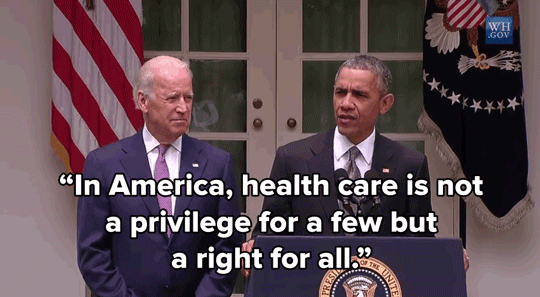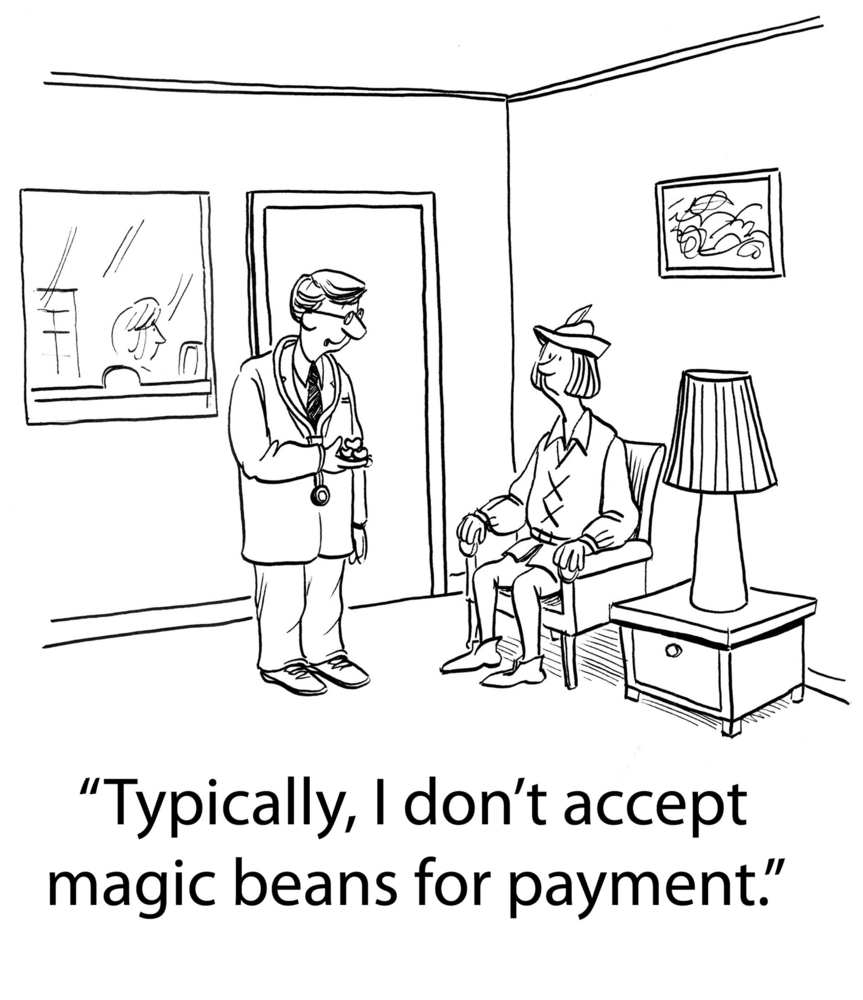Growing up, you may not have had to worry too much about health insurance. When it comes time for you to go out on your own, however, making sure that you have health insurance is crucial. Many colleges actually require proof of insurance before they let you enroll. Having health insurance provides a buffer between an illness and your pocketbook.

President Obama / Giphy
Instead of having to pay all of your medical costs out of pocket, you may only have to pay $30 for a visit (this is called a co-pay) or pay a deductible. A deductible is the amount of money that you have to pay out of pocket before your insurance kicks in and pays the rest. Insurance may also cover all or part of the cost of medication, ambulances, preventative care, lab services, and emergency procedures. The cost of this care without any insurance can be outrageously high. One woman in California received a $1,772 bill for a 15-minute ambulance ride.

Cartoon Resource / Shutterstock.com
The Affordable Care Act, often referred to as Obamacare, requires individuals to meet minimum requirements for health insurance. Having specific insurance, such as dental or vision, does not fulfill minimum requirements. Individuals are required to have blanket health insurance. This could be an employer-sponsored plan, TRICARE, or insurance purchased through the health insurance marketplace, for example. Anyone who fails to meet the minimum requirements is liable to pay $695 or 2.5% of his or her annual household income, whichever is greater.
Insurance can be a tricky subject to approach, though. It’s hard to understand, and many people have so little experience that they don’t know where to start. This blog will give a brief overview of your insurance options, but consider reading Student Caffé’s section on health insurance for a more in-depth explanation of your options and answers to common health insurance questions.
Check to see if your parents have health insurance and if it covers you.
Affordable Care Act legislation states that a child can remain on a parent or guardian’s health insurance until turning 26 years old, even if he or she is married or covered by another form of insurance. If your parents have health insurance, ask if you are covered or if they’d be willing to pay to keep you on their insurance through college or until your 26th birthday.
If you have siblings who are under 26 years old, your parents may not have to pay any extra to keep you covered under their insurance. Family plans often cover both spouses and any number of children. If your parents are worried about cost, you may be able to negotiate with them and pay your parents instead of working out medical expenses with an insurance company directly. It will save you a lot of hassle.
It is important to check who your medical providers will be at school, especially if you plan on attending college out of state. Health insurance companies have networks of preferred physicians who accept their plans, so you’ll want to check on your insurance company’s website for a list of accepted health care providers or at your local doctor’s office to see which insurers it accepts.
Enroll in your school’s health insurance plan.

Monkey Business Images / Shutterstock.com
Many colleges are aware that students may be trying to conquer health insurance on their own for the first time as freshmen. In an attempt to make that easier and more affordable, schools will often offer a student health insurance plan, and students can opt in for the duration of their education. A school plan will meet all minimum requirements set out by the federal government and is typically a more affordable option than one purchased through the insurance marketplace. If you do not provide proof of insurance before the beginning of the year, your school has the authority to automatically enroll you in its plan and bill you for it later.
Learn about your state or federal insurance options and enroll in one that suits your needs.
If you’re not interested in the school plan and you’re not able to be covered by your parent or guardian for whatever reason, you can shop for insurance plans through the federal health insurance marketplace or through your state marketplace (you’ll have to do a web search to see if your state has one). The marketplace lets you pick plans that best suit your needs, since insurance costs can vary depending on your age, state, and income.
You can purchase state and federal health insurance during the open enrollment period each year: November 1 through January 31. If you move to a different state or turn 26 years old, you may be eligible to purchase insurance during a different enrollment period. It’s important to shop around for insurance, which can be pricey. Your school, Medicaid, or a private insurer may offer a better deal than what you may find on the marketplace.
If you’re not earning much money, enroll in Medicaid.

Lemau Studio / Shutterstock.com
Medicaid is a health insurance option run through the federal and state governments that caters to low-income U.S. citizens. Currently, 31 states and the District of Columbia participate in the Medicaid program. In order to qualify for Medicaid, your income cannot be more than 133% of the federal poverty level. You can learn more about qualifications, by state and income level, here. If you are looking for insurance plans in the federal or state marketplace, you might be surprised to find out that you are eligible for Medicaid. The marketplace can connect you to Medicaid offices if you qualify.
Consider private insurers.
Your final option is to explore private health insurance companies. Typically, they offer plans that are more expensive than the insurance plans offered through your school or the insurance marketplace, but it never hurts to shop around. Compare as many plans as you can find, and compare private plans with those offered on the marketplace and through your school so that you can find a plan that fits the requirements of the government and your own personal needs.
If you are an undocumented student or an international student, there are still health insurance plans in which you are eligible to participate. Learn more about your options for coverage here.
What about vision and dental insurance?

Rudolph the Red Nosed Reindeer / Giphy
These are additional options that you can choose to purchase. Unless otherwise stated, they will not be included in a blanket health care plan. Both are typically inexpensive but have limitations to what they will cover. Having vision insurance, for example, may mean that you can replace your glasses each year, but contacts may not be covered. Typically you have to choose one or the other. Dental is the same way. You may only be required to pay a co-pay for a preventative cleaning, but a root canal may not be covered.
Insurance may seem like an impossible hurdle, but exploring the options detailed here and reading Student Caffé’s articles about health insurance in detail should point you in the right direction.
-
The Importance of Physical Education and Exercise
-
Understanding and Coping with Anxiety in College
-
The Sleep-College Relationship
-
How to Avoid Burnout in All Areas of Your Life
-
Seasonal Affective Disorder in College: Coping with Winter Depression
-
15 Ways to Avoid Gaining the Freshman 15
-
Eight Ways to Stay Fit during the Winter Months without Hitting the Gym
-
Everything You Need to Know about Crohn’s Disease
-
How Sick Is Too Sick to Attend Work or Class?
-
Easy Ways to Stay Fit When You’re Busy with School
-
Put Your Insomnia to Rest: Sleeping Well in Times of Stress
-
Health Insurance and College Students

